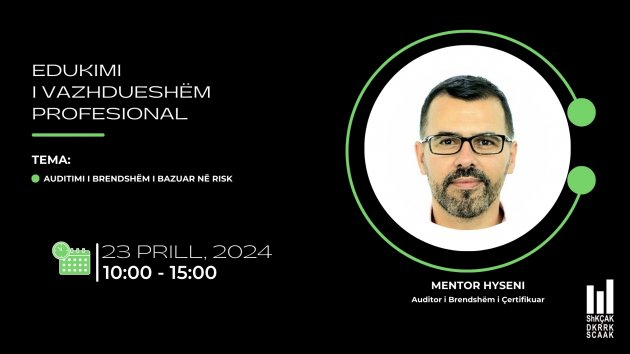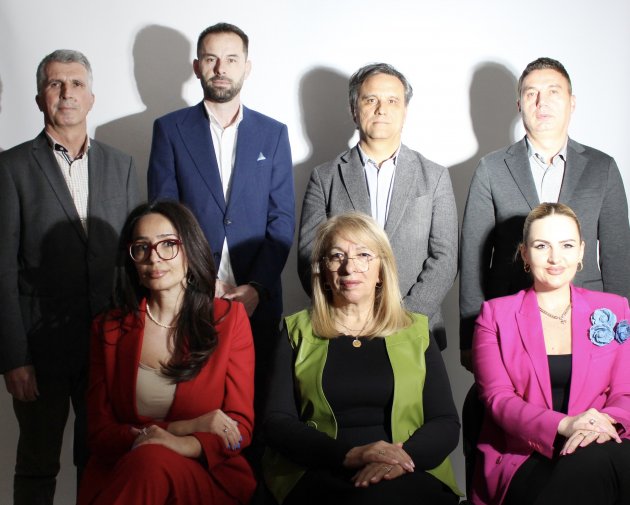Don’t Get Stuck in the Past—How Changing PAO Governance Helped Put Kosovo on the Global Accountancy Map
2018-09-12 - 04:56
In January 2018, IFAC released the publication Focusing on Performance, which raises awareness among PAOs of the importance of good corporate governance practices and principles for their organization. This article series features stories from professional accountancy organizations (PAOs) across the globe that highlight the importance of adapting governance arrangements to drive performance while taking into account current and past governance arrangements.
IFAC recently spoke with Ardiana Bunjaku, Executive Director at the Society of Certified Accountants and Auditors of Kosovo (SCAAK). Ardiana has served as SCAAK’s Executive Director since its founding in 2001 and is a technical advisor to IFAC’s PAO Development Committee. IFAC spoke with her about the importance of establishing a good governance structure within her growing institute.
Background
To better understand SCAAK, it’s important to first understand more about Kosovo. Kosovo is small country that is still transitioning from a post-conflict state to a more open, democratic, and market-based society with significant room for development. Likewise, SCAAK is a young institute—just 17 years old—and recognizes that a great deal of development and growth continue to take place in the upcoming years. As such, the founders and executive management staff knew that SCAAK would need to be built around robust governance arrangements that could adapt to an evolving environment and support potential growth and expansion.
Our First Governance Structure
SCAAK’s first statue and bylaws established a seven-member council of certified accountants. All seven members would be elected for a single two-year term. It was quickly determined that this structure was problematic as SCAAK’s executive management would spend one of those years educating and developing the council-member knowledge and when they departed, beginning again with new council members. SCAAK consequently revised its statue and implemented a new succession plan enabling continuation and sharing of knowledge amongst council members. This change also allowed SCAAK’s executive management the time to pursue new initiatives to progress the institute’s strategic plan and vision.
Recent Initiatives
Among the initiatives executive management was able to focus on was developing education and training to serve both the private and public sector. Most recently, SCAAK launched three new certifications in tax and financial forensics. Consequently, SCAAK has rapidly expanded its membership to include a range of designations across the accountancy spectrum. SCAAK’s members include certified accountants, auditors, National Audit Office auditors, insolvency specialists, internal auditors and financial forensic experts. Instead of keeping its council limited to certified accountants, SCAAK also rearranged its governing structures—the council and committees such as the Education Committee—to comprise balanced representation of its diverse membership. This ensures that SCAAK continues to offer relevant training and education to its members to meet market demand and stakeholder needs; gives voice and representation to all members; and allows SCAAK to receive insights and learnings from other organizations on essential areas, such as quality control and quality assurance.
Growing Pains
The growing pains that SCAAK has faced are likely similar to many PAOs around the world. Fortunately, SCAAK’s founders felt very strongly about investing in the executive office and envisioned a core group of qualified staff with the right technical skills that could steadily lead a growing institute.
Putting SCAAK on the Map
Setting this tone and balance throughout the institute—be it on the council, committees, and between the council and executive office—has been instrumental in putting Kosovo and SCAAK on the map in terms of PAO development and leadership. For example, IFAC’s membership admission process is designed to be rigorous in order to ensure that PAOs fully understand and are able to meet and maintain their membership obligations. It may take established PAOs between two—four years to become an Associate level member and another four—five years after that to become a full Member. SCAAK was able to become an Associate just two years its establishment and, five years later, a full Member. As an institute that was founded to serve Kosovo’s citizens, we remain fully committed to not only meeting all the IFAC Statements of Membership Obligations but also furthering SCAAK’s relevance and services to our stakeholders and the public. This is only possible through continuously enhancing our governance arrangements to drive performance.
Ardiana Bunjaku has been the Executive Director at the Society of Certified Accountants and Auditors of Kosovo since its founding in 2001 and is presently a technical advisor to IFAC’s PAO Development Committee after serving as a member for two terms. Over the last 17 years, she has been instrumental to the development of the accountancy profession and professional education in Kosovo by working with the Government of Kosovo and various donors and promoting institutional cooperation. Ms. Bunjaku is also active as a Chair of the Steering Committee of the University of Pristina (Kosovo’s main and largest public university); a board member of the American Chamber of Commerce in Kosovo; a board member and a member of audit committee of Nova Ljubljanska Banka – NLB Bank in Kosovo; and was appointed by the President of Kosovo to establish and lead the Kosovo Women’s Chamber of Commerce, which is focused on the economic empowerment of Kosovo women.



